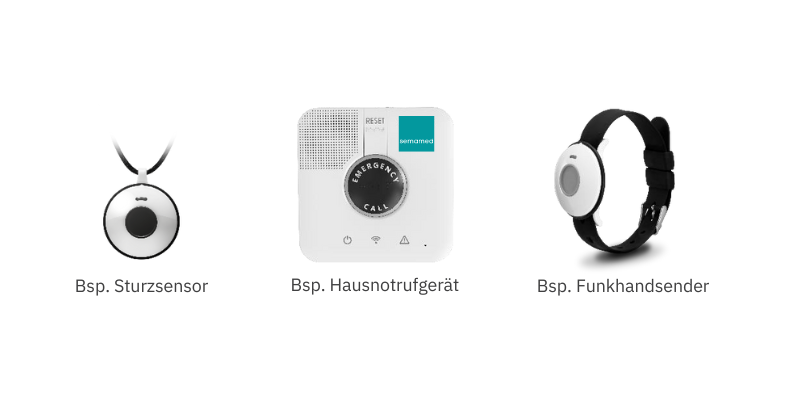Dementia symptoms
Symptoms of dementia
Who hasn't misplaced their front door key, constantly searched for their glasses or couldn't remember where they put their wallet? Is this the beginning of dementia? Or do I just have too much on my mind at the moment?
In times when more and more people are suffering from dementia, this question is frightening. I can reassure you: Just being forgetful is not enough to cause dementia. There must be several symptoms together:
- Remember: there is e.g. B. actually the forgotten key, glasses etc. Orientation: Loss of orientation e.g. B. the time of day, the room or place or later about yourselfRecognize: objects familiar from everyday life are no longer recognized, e.g. E.g. "What do you do with the toothbrush?"Speaking: the patient searches for concepts or words, possibly forming new neologismsActing: sequences of actions that are actually known, such as getting dressed or setting the table, can no longer be done independently be carried out.Thinking: A conversation that contains more than a single piece of information can no longer be followed. The patient is overwhelmed.
Forms of dementia
The most common form of dementia is Alzheimer's dementia. It affects around 72% of people with dementia. The cause is still unclear today. For a while it was suspected that aluminum salts in roll-on deodorants, for example, promote Alzheimer's dementia - inflammatory factors, factors of the immune system, genetic or social-psychological factors are also discussed. A deficiency of the transmitter acetylcholine has been proven, but this is probably only a consequence of Alzheimer's dementia and not a cause There are still no effective medications or vaccinations against the disease. The brain has plaques, becomes smaller and substance is lost. The course begins slowly, initially imperceptibly and progresses slowly. Duration of the disease until the end is approx. 10 - 14 years. Vascular dementia affects around 16% of people suffering from dementia. Vascular dementia affects the vessels, usually caused by many small ones Strokes that destroy brain tissue. The reasons for this can be: heart and vascular diseases, diabetes, lipid metabolism disorders or smoking. The disease progresses gradually. However, individual symptoms can also regress over time. Other dementias, which affect around 1.2% of people suffering from dementia, include Pick's disease. The temporal lobes are affected here, from where sexual behavior is controlled. The affected person is sexually disinhibited and often uses an unbridled, violent choice of words. This disease must definitely be treated with medication. A sick person with such a clinical picture cannot otherwise be socialized. Another of the other dementias is Levy body dementia. This type of dementia often occurs after the onset of Parkinson's disease. The so-called "Levy bodies" form in the brain. All dementia diseases (except Pick's disease) have a similar course. Abnormalities are individual and therefore cannot be linked to a specific dementia.
The differences between Alzheimer's and dementia
Difference between Alzheimer's and dementia
Dementia is the main term. Alzheimer's is a special variant. The neurologist Alois Alzheimer first described Alzheimer's as an independent disease in 1906.
Alzheimer's disease is a progressive, incurable brain disorder with an unknown cause. Symptoms of this disease include memory loss, confusion and disorientation. In addition, there are changes in personality, impaired judgment and the loss of the ability to speak. Alzheimer's disease involves protein deposits, so-called plaques, in the brain, in the immediate vicinity of which the nerve cells die. As a result, the brain shrinks. It is the most common form of dementia. A distinction is made between the sporadic and hereditary forms.
Sporadic Alzheimer's disease:
- Affects approximately 99.5 percent of all cases. Mostly late age of onset, from 65 years old. Age is the most important risk factor, with little influence of genetic factors
Hereditary Alzheimer's disease:
- Familial Alzheimer's disease: Only affects around 1 percent of all cases. Early age of onset (between 30 and 60 years). The trigger is the causative mutation in three genes: APP (chromosome 21), presenilin-1 (chromosome 14) and presenilin-2 (chromosome 21 ) Carriers of these modified genes get sick 100 percent of the time.
There is no treatment that can cure Alzheimer's disease. People suffering from the disease today can only resort to medications that control the symptoms and/or slow the progression of the disease.
Alzheimer's disease is divided into 3 stages:
Early stage
In the early stages of Alzheimer's disease, many patients tend to have a lack of motivation, but this is usually hardly noticeable. Minor memory gaps and mood swings occur, and the ability to learn and react decreases. The sick people close themselves off to new things and prefer what they are familiar with.
Speaking and thinking slows down. It can happen that patients lose the thread in the middle of a sentence, can no longer find their way around or forget to pay bills. Accordingly, the symptoms of the disease begin to affect work and everyday life more and more. When those affected become aware of their deficits, depression, irritability and restlessness can result.
Middle stage
At this stage the disease becomes obvious. Living an independent life is hardly possible anymore. Initially, patients can carry out tasks on their own, but need help in dealing with more complicated things. The people around them have to make clear requests and repeat them more and more often. The urge to move increases, speech and comprehension become increasingly slower, sufferers often repeat individual statements numerous times and lose their understanding of time and space. They increasingly recognize familiar faces worse. While the memory of the past remains with them for a long time, they remember the recent events less and less.
Late stage
In the final stages of the disease, Alzheimer's patients require around-the-clock care. Long-term memory dwindles, language skills are limited to a few words, and familiar people are no longer recognized. Chewing, swallowing and breathing become increasingly difficult, and there is also urinary and fecal incontinence. Due to the insufficient ability of their immune system to defend themselves, Alzheimer's patients in this stage often suffer from pneumonia, infections or other diseases. This late stage ultimately leads to death.
Vascular dementia accounts for around 15 percent of all dementias. Vascular dementia occurs due to a disruption in the blood supply to the brain. The cause is either a ruptured blood vessel (cerebral hemorrhage) or a blood clot (cerebral infarction). In both cases, brain tissue is destroyed by vascular dementia.
In addition to the sudden onset or sudden deterioration, neurological deficits are typical for vascular dementia. Hemiplegia, sensory disturbances, visual disturbances and clouding of consciousness occur. The risk of later suffering from vascular-type dementia is increased by all factors that lead to diseases of the blood vessels contribute.
Abnormal densification of brain cells also leads to dementia. This form is known as "dementia with Lewy bodies". Its symptoms are similar to those of Parkinson's and Alzheimer's diseases. The cause of this form of dementia is currently unknown. Estimates of how many people are affected by dementia with Lewy bodies vary It is probably the third most common form. It is possible that the so-called dementia with Lewy bodies is not a separate disease, but rather a variant of Parkinson's dementia. In any case, both the symptoms and the findings of specific inclusion bodies in the brain cells are similar To distinguish one disease from another, the 1 year rule has been formulated:
- If the movement control disorders typical of Parkinson's occur more than a year before dementia, it is referred to as Parkinson's dementia. If the dementia occurs before the movement disorders or in the first year after, it is referred to as dementia with Lewy bodies.
Frontotemporal dementia occurs somewhat less frequently than dementia with Lewy bodies. In her case, the frontal and temporal lobes of the brain are affected. Since these brain regions are involved in controlling behavior and experiencing emotions, frontotemporal dementia becomes noticeable through early changes in personality structure. Behavior becomes detached. Inhibitions that have previously characterized the sick person's interactions with caregivers disappear. The sick person disregards social and moral norms. The personality structure becomes coarser. Cognitive disorders, such as memory loss or impaired thinking and judgment, only occur secondarily. Frontotemporal dementia develops just like Alzheimer's disease, slowly and progressively. Symptoms and side effects include fidgeting and restlessness, compulsive drive behavior, impulsivity, declining personal hygiene, slow loss of speech. Almost half of those affected have a parent, brother or sister who suffers from some form of dementia.
Secondary dementia
Some rarer dementias are classified as secondary dementias. They are triggered by depression, medication, alcohol addiction, thyroid disease or a vitamin deficiency. Unlike Alzheimer's and many other primary dementias, secondary dementias can sometimes be cured if the underlying disease is treated early enough.
The difference between primary and secondary dementia is that primary dementia originates in the brain.















